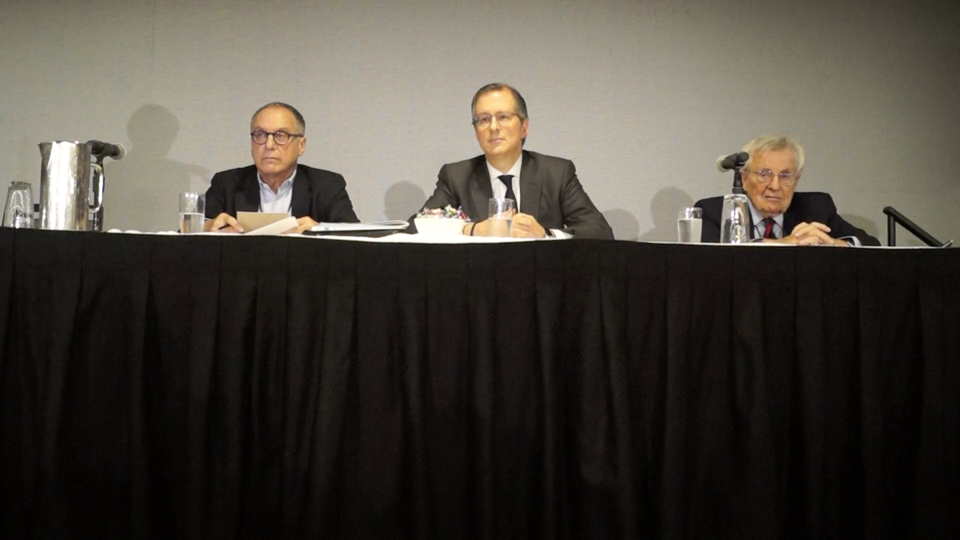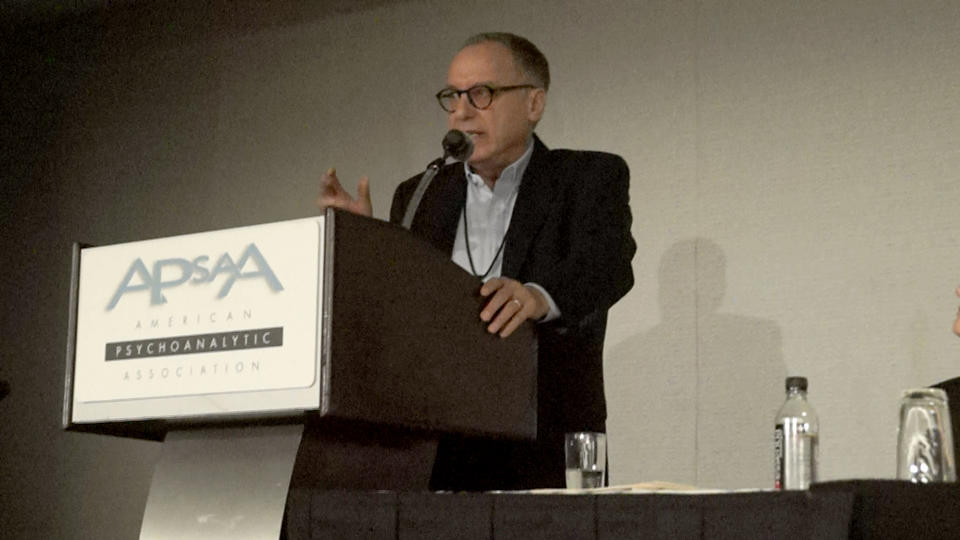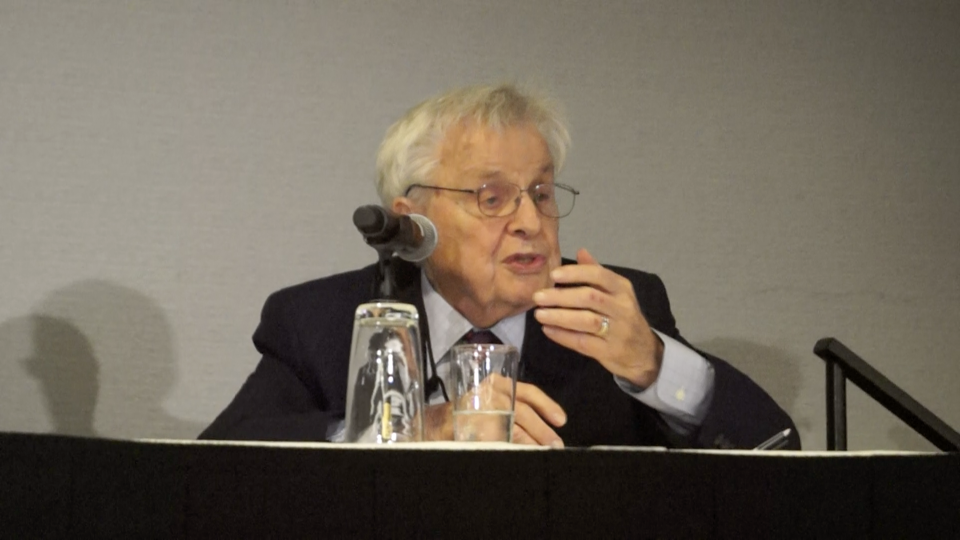The public role of psychoanalysts in the Trump era: 'We live in ominous times'

In our highly politicized times, how can psychoanalysts contribute to the national discourse in ways that are both ethical and effective?
Prominent practitioners recently addressed this question and the implications of commenting on public figures — most notably President Trump — at the American Psychoanalytic Association’s (APsaA) 2018 national meeting. Their open-ended discussion last week encouraged psychoanalysts and their organizations to take an active role in contemporary political matters.
“How do we get psychoanalysts to have an impact on society in a way beyond the day-to-day work with patients and help the public understand a range of psychological phenomena, not just the behavior and psychology of a president, but of those who support him?” Kerry J. Sulkowicz, a psychiatrist and psychoanalyst, told Yahoo News. “I think mental health professionals certainly have something to contribute.”
The role of psychoanalysts in the public domain attracted attention after a series of misleading reports and conflated terms came to public attention. To recap, STAT News published an article in July 2017, saying that APsaA had told its members they could defy the “Goldwater Rule” against commenting on the mental health of people they have not evaluated. This was presented as the “first significant crack in the profession’s decades-old united front.” But APsaA never observed the Goldwater Rule in the first place, and was merely reminding its 3,500 members of its longstanding position permitting members to speak out on issues of public concern. The American Psychiatric Association (APA), which has roughly 10 times as many members, retains the Goldwater Rule in its code of ethics.
The controversy stemmed from public confusion over the terms psychiatrist and psychoanalyst. A psychiatrist is a licensed medical doctor specializing in the treatment of mental illness, including with medication. A psychoanalyst is a specific kind of therapist trained in the methods pioneered by Sigmund Freud to treat mental disorders. These categories can, but do not necessarily, overlap.

On Feb. 16, Sulkowicz and two other leading psychoanalysts participated in a panel before roughly 300 PsaA conference attendees at the New York Hilton.
Jonathan Lear, a professor of philosophy at the University of Chicago who trained as a psychoanalyst at the Western New England Institute for Psychoanalysis, said that “we live in ominous times,” where people have a sense that something bad is about to happen. He thinks Trump is “a bad president” and is “part of the reason it’s a dangerous time,” but said there’s a danger with diagnosing Trump psychologically — because it can serve as a defense against trying to understand the larger historical context in which the president has operated and succeeded. His speech focused on the increasing numbers of citizens who feel left behind by the global economy. He said Trump may be a problematic personality, but warned against denigrating all of his supporters with too broad a brush.
“The line of Hillary [Clinton]’s during the campaign that there’s this ‘basket of deplorables,’ for me, is a deplorable thing to think about our fellow citizens if we’re going to continue as a polis,” Lear told the audience. “They feel ignored. To call them nuts is giving yourself permission to ignore them even more, which repeats and exacerbates the problem.”
After the talk, Lear told Yahoo News that he fundamentally believes in the value of freedom of speech for the country and psychoanalysis, so he doesn’t think any organization should restrict the speech of its members.
However, he said he thinks the incident that gave rise to the Goldwater Rule looks “pretty embarrassing” in retrospect. Back in 1964, Fact magazine published an article, “The Unconscious of a Conservative: A Special Issue on the Mind of Barry Goldwater,” in which 12,356 psychiatrists were asked whether Goldwater was psychologically fit to be president. Of the 2,417 respondents, 1,189 said the Arizona senator and Republican presidential candidate was unfit for the White House. Some doctors even provided specific psychological diagnoses of Goldwater, including paranoid schizophrenia and chronic psychosis, without ever having examined him. Goldwater sued for libel and was awarded $75,000 in damages. As a result, the APA established the Goldwater Rule.

“On the other hand, do I think they have a right to say it? Yes. Can Goldwater sue them? Yes. It’s not that I agreed with the speech of people who were diagnosing Goldwater,” Lear said. “I think it was not a good idea, in so far as they opened themselves up to a legal liability. But I don’t think institutions should be in the business of regulating speech.”
Lear said there’s a world of difference between a mental health professional saying, “I have an informed opinion” and saying, “I have a clinical diagnosis.”
“You can say, ‘Look, I’ve seen a lot of people. I’ve had a lot of clinical expertise. He’s not my patient, but I think I know what I’m talking about,’” he suggested.
Jerrold Post, a professor emeritus of psychiatry, political psychology and international affairs at the George Washington University in Washington, D.C., took issue with a statement that the APA sent to psychiatrists in August 2016, which read: “The unique atmosphere of this year’s election cycle may lead some to want to psychoanalyze the candidates, but to do so would not only be unethical, it would be irresponsible.” Post said that taking such a stance can repress voices that should be heard. He said many of his colleagues feel this amounts to an abridgment of their free speech and the prerogatives of being a citizen.
“We have something to contribute. I think it’s important if ‘he who must not be named’ is a consummate quintessential narcissist. It’s important to say, ‘We have something to understand about what’s below the surface of this arrogant façade.’ I would call upon our society, the APA, to reexamine the severity of this,” Post said.

Rather than sounding off with psychobabble, Post encouraged psychoanalysts to conduct well-founded studies of textual analysis that help the public understand the public manifestations of narcissism and other mental disorders: “I think we have something very useful and imperative to offer.”
After the panel, he told Yahoo News that psychological insights into groups and individuals are both important right now. The president, he said, has tapped into a powerful phenomenon in American society, a resentment against elites that could prove disruptive and dangerous.
“He’s quite importantly touching on a psychological theme of those who felt left behind, those who feel that technological advance has gone too far. I find quite remarkable his ability to prompt outrage and fury at those who are trying to keep up with the rapidly modernizing world,” he said.
And Post knows firsthand how psychological expertise can benefit the nation. Before joining George Washington, he spent 21 years with the Central Intelligence Agency, where he founded and directed the Center for the Analysis of Personality and Political Behavior, a behavioral science unit that provided profiles of foreign leaders for the president and other senior officials to give them guidance in meetings, negotiations and crises. He’s created profiles of North Korean leaders Kim Il Sung, Kim Jong Il and now Kim Jong Un. He expressed concern over the possibility that the war of words between Kim and Trump could lead to a dark place.
“I think there’s a very real possibility going beyond this war of words that these two individuals — who have not, however, been tested in crisis and love to pronounce these strong words and are caught up in this escalating and spiraling conflict — there’s a very real possibility of stumbling into an inadvertent war,” Post said.

Sulkowicz, a clinical professor of psychiatry at New York University, is the founder and managing principal of the Boswell Group, which advises business executives on aspects of corporate life with “complex psychological and systemic underpinnings.” Sulkowicz, who was trained as both a psychiatrist and psychoanalyst, has been outspoken in voicing his serious concerns about Trump’s mental state. He thinks the Goldwater Rule is profoundly misguided and inapplicable to a truly psychoanalytic way of approaching individual and group behavior.
“Psychoanalysts are less interested in diagnosis and much more interested in understanding a range of social phenomena,” he told the audience.
Sulkowicz said he’s spoken out against Trump in part because he wants to live up to the psychoanalytic ideals and values that caused him to choose his profession: alleviating suffering, listening, understanding, being honest, respecting history, practicing empathy, pursuing truth and respecting people at their most vulnerable.
“If this set of values doesn’t sound like the basis for activism in the public domain, then I don’t know what does,” he said.
It strikes Sulkowicz as naïve at best, or a form of denial at worst, for psychoanalysts to insist that they are as neutral as some of them would like to suggest.
“We can’t be so neutral and abstinent in the public domain when it comes to what we stand for,” Sulkowicz said. “I believe we should be talking more about our psychoanalytic values, especially in these deeply disturbing times when such values are under attack.”
Harriet L. Wolfe, the president of the APsaA, told Yahoo News that psychoanalysts have to continue thinking of ways to effectively apply their expertise in the public domain.
“I think there has been a general agreement in mental health professions that the Goldwater Rule in its base form, which says it’s not proper to diagnose someone you haven’t interviewed, has been used, in my view, almost to a political end — as a gag rule — in the current sociopolitical climate,” she said.
Read more from Yahoo News:



